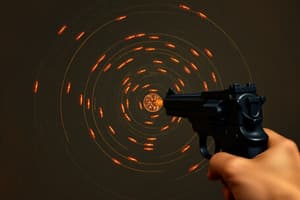Podcast
Questions and Answers
What is ballistics?
What is ballistics?
Study of bullets and ammunition through the comparison of fired bullets, cartridges, guns, and gunpowder patterns on people and objects.
Gunpowder is made of _____, _____, and _____.
Gunpowder is made of _____, _____, and _____.
potassium nitrate, charcoal, sulfur
What happens when gunpowder is ignited?
What happens when gunpowder is ignited?
Gunpowder expands and causes a violent explosion.
What is a cartridge?
What is a cartridge?
What is primer in firearm terminology?
What is primer in firearm terminology?
What are long guns?
What are long guns?
What characterizes shotguns?
What characterizes shotguns?
What is a revolver?
What is a revolver?
What distinguishes a semi-automatic pistol?
What distinguishes a semi-automatic pistol?
The Glock has a trigger pull of around 12 pounds.
The Glock has a trigger pull of around 12 pounds.
What is a hollow point bullet designed to do?
What is a hollow point bullet designed to do?
What defines caliber in firearms?
What defines caliber in firearms?
The wad in shotgun shells serves what purpose?
The wad in shotgun shells serves what purpose?
What is a wadcutter bullet used for?
What is a wadcutter bullet used for?
What is the main characteristic of lead used in bullets?
What is the main characteristic of lead used in bullets?
Flashcards are hidden until you start studying
Study Notes
Ballistics Overview
- The study of bullets and ammunition considers fired bullets, cartridges, guns, and gunpowder patterns.
- Crucial for forensic analysis in criminal investigations.
Expert Determination
- Determines type of firearm and caliber.
- Assesses the number of bullets fired and their positions.
- Evaluates if a weapon has been previously used.
Gunpowder Composition
- Made from potassium nitrate, charcoal, and sulfur.
- Ignition leads to rapid expansion, causing explosions.
Cartridge Definition
- A cartridge contains a bullet, primer powder, and gunpowder; also referred to as a round.
Primer Function
- Ignites gunpowder or propellant when struck by the firing pin.
Long Guns
- Includes rifles and shotguns requiring two hands for accurate shooting.
Rifle Characteristics
- Fires long, thin bullets, and used for hunting and military applications.
- Offers long-range accuracy, with firing modes from single-shot to fully automatic.
Shotgun Specifications
- Fires small pellets (shots) or slugs, utilizing shotgun shells.
- Effective at short distances with pellets spreading upon firing.
Shotgun Shells
- Contains a wad of plastic or fiber that separates shot from powder for efficient gas sealing and bullet propulsion.
Handgun Features
- Short bullets and barrels reduce rifling, affecting long-distance accuracy.
Revolver Design
- Holds up to six cartridges, features single or double action, and lacks safety measures.
- Can fire 5-8 rounds while retaining shells.
Pistol/Semi-Automatic Details
- Fires bullets sequentially; can load up to 10 cartridges in a magazine.
- Semi-automatic fires one bullet per trigger pull; automatic continues firing as long as triggered.
Glock Characteristics
- Holds 17 rounds and has a lighter, more accurate trigger pull (around 5 pounds).
- Lightweight and durable, designed for regular use without extensive cleaning.
Bullet Types
- Full Metal Jacket: Copper casing improves exit velocity, maximizes penetration, and maintains shape upon impact.
- Half Metal Jacket: Lead bullet partially coated with copper; promotes accurate penetration and controlled expansion.
- Lead Bullets: Inexpensive, dense, and malleable.
- Wadcutter: Flat bullet used for target practice, known for creating neat holes.
- Round Nose: Maximizes penetration and easily loads into chambers.
- Hollow Point: Designed for soft targets, expands upon impact for greater damage.
- Shredder: Serrated tip bullet that causes significant tissue damage.
Caliber Information
- Bullets are categorized by caliber (diameter) and length, typically measured in inches or millimeters.
- Caliber corresponds to the internal diameter of a firearm's barrel.
Firearm Operation
- The firing pin strikes the cartridge base, igniting the primer.
- Sparks travel through the flash hole to ignite the main propellant, leading to bullet discharge.
Studying That Suits You
Use AI to generate personalized quizzes and flashcards to suit your learning preferences.




